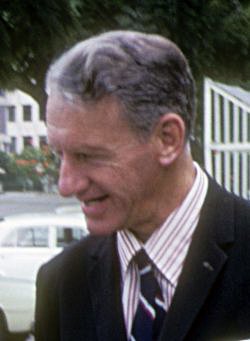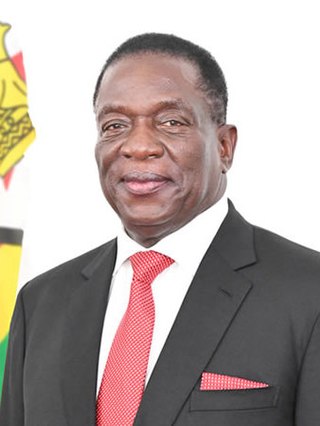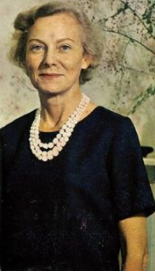Communications in Zimbabwe refers to the communication services available in Zimbabwe.

Ian Douglas Smith was a Rhodesian politician, farmer, and fighter pilot who served as Prime Minister of Rhodesia from 1964 to 1979. He was the country's first leader to be born and raised in Rhodesia, and led the predominantly white government that unilaterally declared independence from the United Kingdom in November 1965 in opposition to the UK's demands for the implementation of majority rule as a condition for independence. His 15 years in power were defined by the country's international isolation and involvement in the Rhodesian Bush War, which pitted the Rhodesian Security Forces against the Soviet- and Chinese-funded military wings of the Zimbabwe African National Union (ZANU) and Zimbabwe African People's Union (ZAPU).
Land reform in Zimbabwe officially began in 1980 with the signing of the Lancaster House Agreement, as a program to redistribute farmland from white Zimbabweans to black Zimbabweans as an effort by the ZANU-PF government to give more control over the country's extensive farmlands to the black African majority. Before the implementation of these policies, the distribution of land in what was then known as Rhodesia saw a population of 4,400 white Rhodesians owning 51% of the country's land while 4.3 million black Rhodesians owned 42%, with the remainder being non-agricultural land. The discrepancy of this distribution, as well as the overall dominance of the white population in the newly-independent but largely unrecognized Rhodesian state was challenged by the black nationalist organizations ZANU and ZAPU in the Rhodesian Bush War. At the establishment of the modern Zimbabwean state in 1980 after the bush war, the Lancaster House Agreement held a clause that prohibited forced transfer of land, this resulted in changes in land distribution from the willing sale or transfer by owners being minor until 2000, when the government of Robert Mugabe began a more aggressive policy.

Midlands is a province of Zimbabwe. It has an area of 49,166 square kilometres (18,983 sq mi) and a population of 1,811,905 (2022). It is home to various peoples. Located at a central point in the country, it contains speakers of Shona, Ndebele, Tswana, Sotho and Chewa, as well as of various other languages. Gweru, the third-largest city in Zimbabwe, is the capital of the province.

Ndabaningi Sithole was the founder of the Zimbabwe African National Union (ZANU), a militant, nationalist organisation that opposed the government of Rhodesia, in July 1963. Sithole's father was Ndau and his mother was Ndebele. He worked as a United Church of Christ in Zimbabwe (UCCZ) minister. He spent 10 years in prison after the government banned ZANU. A rift along tribal lines split ZANU in 1975, and he lost the 1980 elections to Robert Mugabe.

Gweru, originally known as Gwelo, is a city in central Zimbabwe. It is on the centre of Midlands Province. Originally an area known to the Ndebele as "The Steep Place" because of the Gweru River's high banks, in 1894 it became the site of a military outpost established by Leander Starr Jameson. In 1914 it attained municipal status, and in 1971 it became a city.

Edgar Zivanai Tekere, nicknamed "2 Boy", was a Zimbabwean politician. He was the second and last Secretary General of the Zimbabwe African National Union (ZANU) who organised the party during the Lancaster House talks and served in government before his popularity as a potential rival to Robert Mugabe caused their estrangement.

Beitbridge is a border town in the province of Matabeleland South, Zimbabwe. The name also refers to the border post and bridge spanning the Limpopo River, which forms the political border between South Africa and Zimbabwe. The border on the South African side of the river is also named Beitbridge.
The following lists events that happened during the year 2000 in Zimbabwe.

Emmerson Dambudzo Mnangagwa is a Zimbabwean politician who is serving as President of Zimbabwe since 24 November 2017. A member of ZANU–PF and a longtime ally of former President Robert Mugabe, he held a series of cabinet portfolios and he was Mugabe's Vice-President until November 2017, when he was dismissed before coming to power in a coup d'état. He secured his first full term as president in the disputed 2018 general election. Mnangagwa was re-elected in the August 2023 general election with 52.6% of the vote.
Articles related to Zimbabwe include:

Didymus Noel Edwin Mutasa is a Zimbabwean politician who served as Zimbabwe's Speaker of Parliament from 1980 to 1990. Subsequently, he held various ministerial posts working under President Robert Mugabe in the President's Office. He was Minister of State for Presidential Affairs from 2009 to 2014 and also served as ZANU-PF's Secretary for Administration.

Robert Gabriel Mugabe was a Zimbabwean revolutionary and politician who served as Prime Minister of Zimbabwe from 1980 to 1987 and then as President from 1987 to 2017. He served as Leader of the Zimbabwe African National Union (ZANU) from 1975 to 1980 and led its successor political party, the ZANU – Patriotic Front (ZANU–PF), from 1980 to 2017. Ideologically an African nationalist, during the 1970s and 1980s he identified as a Marxist–Leninist, and as a socialist during the 1990s and the remainder of his career.

Shurugwi, originally known as Selukwe, is a district located in Midlands Province, southern Zimbabwe. 98,315 people live in Shurugwi rural and 23,304 live in Shurugwi town.
Lower Gwelo is a developed communal settlement in the Midlands province, Zimbabwe and is located about 40km north-west of Gweru, and stretches a further 50 km to the west. Lower gwelo was initially called Somabhula and later became Somabhula ekhanyayo after the establishment of Seventh day adventist missions stations that covered the entire area. The 2 main Chiefs in the Lower Gwelo area are Chief Sogwala and Chief Bunina. There are 5 Headmen under Chief Sogwala:
The Zimbabwe Unity Movement, was a short lived political movement in Zimbabwe. It served as a successor and link to the Conservative Alliance of Zimbabwe. Edgar Tekere ran as Presidential Candidate in the 1990 Zimbabwean Presidential election, against Robert Mugabe.

Gweru District is a district in the Midlands Province of Zimbabwe.

Janet Duvenage Smith, was the wife of Ian Smith, Prime Minister of Rhodesia from 1964 to 1979. Born in Cape Town, South Africa, she studied history at the University of Cape Town and became a teacher. In 1942, she married Piet Duvenage, a rugby player, and had two children. He died in an accident on the rugby field in 1947. The next year, a short visit with family in Southern Rhodesia became permanent when she accepted a teaching job in Selukwe. There, she met her future husband, Ian Smith, who had recently come home from the Second World War. In 1948, the couple got married and bought a farm, and Ian was elected to the Southern Rhodesian Legislative Assembly.

Relations between the UK and Zimbabwe have been complex since the latter's independence in 1980. The territory of modern Zimbabwe had been colonised by the British South Africa Company in 1890, with the Pioneer Column raising the Union Jack over Fort Salisbury and formally establishing company, and by extension, British, rule over the territory. In 1920 Rhodesia, as the land had been called by the company in honour of their founder, Cecil Rhodes, was brought under jurisdiction of the Crown as the colony of Southern Rhodesia. Southern Rhodesia over the decades following its establishment would slowly be populated by large numbers of Europeans emigrants who came to form a considerable diaspora, largely consisting of Britons but also smaller groups of Italians, Greeks and Afrikaners. A settler culture that had already existed since the time of company would come to cement fully and the white population began to identify as Rhodesians, often in conjunction with British/Afrikaner/Southern European identities of their ancestors. Southern Rhodesia would go on to participate heavily in both the First and Second wars, providing soldiers and military equipment to the British war effort.

State House, formerly called Government House, is a former Government House in Bulawayo, Zimbabwe. It was used by the British South Africa Company during their rule in Rhodesia. It was built by Cecil Rhodes in 1897 as his personal residence. It is now used as the official Bulawayo residence for the President of Zimbabwe.













